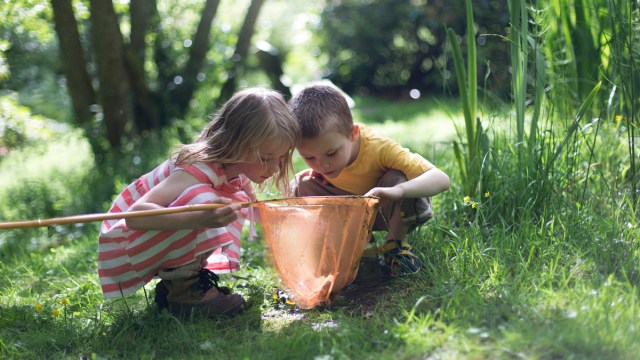How many questions a day do you answer? Probably thousands, right? Congrats. You are winning at this parenting thing
They say that curiosity may have killed the cat, but as it turns out, it’s a great thing in kids. And since research suggests that curiosity is an accelerant, if not a root cause of learning, then it’s no surprise that educators are taking a closer look at the relationship between natural curiosity in kids and skills that predict success in life. Here are five reasons why supporting your curious kid is more important than ever.
Curiosity Drives Learning
As noted in Psychological Science, “Researchers have demonstrated that curiosity—long thought to help motivate learning—is also associated with better learning outcomes.” Simply—a child’s curiosity about a subject correlates with whether they’ll retain what they learn. Most interestingly, kids remember lessons the most when they were stumped in the first place. Curiosity and learning are, therefore, less about finding answers than about the process of seeking understanding.
Educators who slow down and provide students time to wonder and be curious about an idea before expecting them to provide a rote answer are adept at fostering curiosity in the classroom. “Curiosity does not hold up well under intense expectation. Our role as teachers is not to provide answers. Our role is to give time and free rein to inherent curiosity and questions and let our students exist in the heightened state of hungering for knowledge,” explains education advisor and professor Eric Shonstrom.
Curiosity Builds Psychological Safety & Is a Healthy Response to Uncertainty
The Journal of American Medical Association (JAMA) reports children’s depression and anxiety rates may have doubled since the start of the COVID-19 pandemic. Developing a curiosity skillset can help create your children’s psychological safety, which is the idea that someone feels safe or not afraid of being labeled or criticized for saying what they are thinking and feeling, as well as equip them with a healthy response to operating amid uncertainty.
Curiosity is also a healthy response for a child operating amid uncertainty; seeking more information helps children feel more empowered, which combats the anxiety of helplessness. “When you learn to ask more questions—especially in ambiguous situations—you’re building ‘curiosity muscles,'” says Liz Guthridge, founder of Connect Consulting Group.
Related: 13 Beautiful Books for Curious Kids
Curiosity Breeds Persistence & Scientific Thinking

Have you ever been stumped? You’re literally out of ideas, and the best option is to chuck it all and go home. If you can’t think of a way out, you quit. But, when you simply must know who, what, when, where, and why, you rarely run out of questions, and you rarely quit.
Curious kids simply don’t run out of questions. One observation leads to another, and “what ifs” become “how could.” The countless questions often fired from the back seat of your car are exhibits of your child’s persistence. Instead of “giving up” on an idea, they keep turning it over, examining it from new angles and different perspectives. Keep answering those questions—even when it seems like you’re on 1,999,999 because a persistent child is a resilient child.
Curiosity Counteracts Boredom & Grows Self-Sufficiency
The old saying “curiosity killed the cat” isn’t too far off the mark when you consider most of the trouble that kids get into starts with boredom. Naturally curious children can go “un-entertained,” a.k.a. flat-out-bored, without incident. When your child is occupied with imagination—about how things work, about discovering solutions to challenges that everyday interactions in the world afford—they are more likely to be able to figure things out in other situations. Ultimately, curiosity gives children opportunities to become more confident and that grows self-sufficiency.
According to the American Academy of Pediatrics, sensory play is an excellent way to spark a young child’s curiosity. As they reach out to what is around them, their discoveries are cataloged. The more experiences they gather, the better they become at differentiating between them, and their curiosity about what makes one experience different from the next will grow.
Curiosity Makes Your Kids Happier
Instead of being inwardly focused, curious children are aware of what’s going on around them. Research has shown that trying new things, looking for new adventures, and being interested in others promote overall well-being. And, as noted in Greater Good Magazine, our brains release dopamine and other feel-good chemicals when we encounter new things. So, if your curious kid is busy expanding their horizons, whether in school, in activities, or in friendships, there’s a good chance they’re going to feel pretty darn good about themselves.
Related: 7 Podcasts That Curious Kids Will Love











